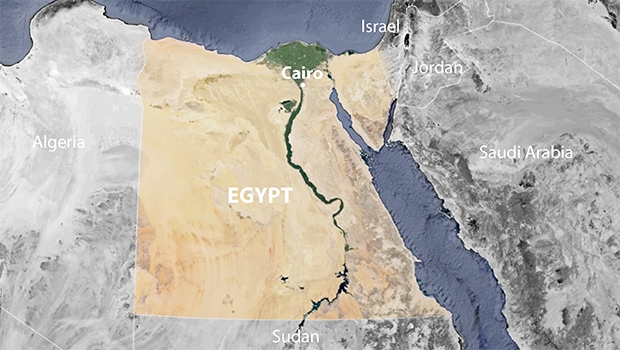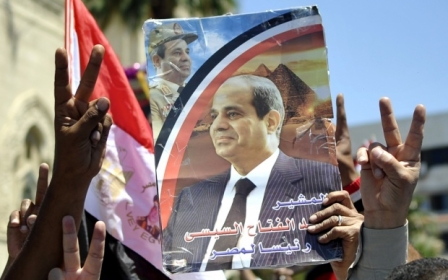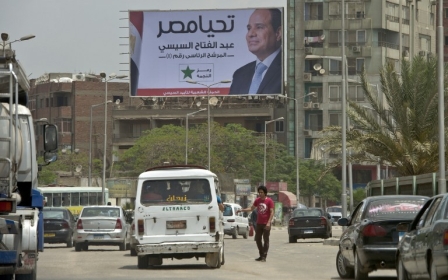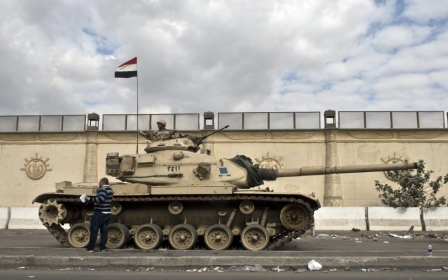A guide to Egypt facts and key events since 2011

Key developments in Egypt since the January 2011 uprising that toppled the 30-year rule of president Hosni Mubarak:
2011
- January 25: Massive protests erupt after a revolt topples Tunisia's ruler. About 850 people die over 18 days.
- February 11: Mubarak resigns and hands power to the army which suspends the constitution and dissolves parliament.
- November 28: Egypt holds post-revolt parliamentary election. Islamists win about two-thirds of the seats, half of which go to the Muslim Brotherhood.
New MEE newsletter: Jerusalem Dispatch
Sign up to get the latest insights and analysis on Israel-Palestine, alongside Turkey Unpacked and other MEE newsletters
2012
- June 24: Mohamed Morsi wins the presidential poll with 51.7 percent of the vote, becoming Egypt's first freely elected civilian and Islamist leader.
- August 12: Morsi scraps a constitutional document which allowed the military legislative powers.
- December 15 and 22: 64 percent of voters in a two-round referendum back the new constitution.
2013
- January 24: Violence erupts on the eve of the second anniversary of the 2011 uprising. At least 60 people die in a week.
- June 30: Millions of Egyptians protest demanding Morsi's resignation. Millions of others take to the streets to show support for Morsi.
- July 3: Army chief Abdel Fattah al-Sisi ousts Morsi after massive protests against his one-year rule, and freezes the Islamist-drafted constitution. Morsi denounced a "coup" as authorities launch a crackdown against his supporters.
- August 14: Security forces move against two pro-Morsi protest camps in Cairo, killing about 700 people. Amnesty International says more than 1,400 people have been killed in street clashes, and over 15,000 arrested since Morsi's ouster.
- August 22: Mubarak is freed after 28 months in detention.
- November 24: The military-installed authorities pass a new law banning all but police-sanctioned protests.
- December 24: The government declares the Brotherhood a "terrorist" organisation after a suicide car bomb attack kills more than a dozen policemen north of Cairo (although the attack was condemned by the Brotherhood and claimed by a militant group that is critical of the Brotherhood).
2014
- January 14-15: Egyptian voters approve a new constitution that reinforces the military's powers by a vote of 98.1 percent. The vote was officially boycotted by Morsi supporters, while 'vote no' campaigners were arrested.
- January 25: Clashes on the third anniversary of the anti-Mubarak revolt kill at least 49.
- February 16: The first attack on foreigners since Morsi's ouster kills four South Koreans in the Sinai.
- February 25: Ibrahim Mahlab, a former member of Mubarak's now dissolved party, is named prime minister in cabinet reshuffle.
- March 24: Court sentences 529 Morsi supporters to death. A month later 683 others, including Brotherhood leader Mohamed Badie, are also sentenced to death.
- March 26: Sisi announces he will run for president. Leftist leader Hamdeen Sabbahi throws his hat in the ring as well.
- April 28: A court bans the April 6 youth movement that spearheaded the uprising against Mubarak and has protested against the military-installed regime.
Facts about Egypt
Middle East Eye delivers independent and unrivalled coverage and analysis of the Middle East, North Africa and beyond. To learn more about republishing this content and the associated fees, please fill out this form. More about MEE can be found here.





